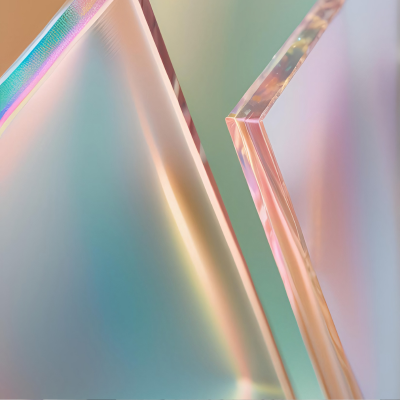When it comes to strong, transparent plastic materials, two stand out in the Sri Lankan construction, signage, and interior design industries: acrylic sheets and polycarbonate sheets. While they might appear similar at first glance, the truth is they perform very differently under specific conditions. Choosing the right material depends entirely on the intended use, environment, budget, and aesthetics. Let’s explore the key differences in detail to help you make an informed decision.
1. Material Strength & Impact Resistance
If your project demands durability and high impact resistance, polycarbonate is the clear winner. It is almost unbreakable and boasts up to 250 times the impact strength of glass. That makes it ideal for environments where safety and strength are priorities.
Example: For newly built railway stations like the one in Kottawa, polycarbonate sheets are used for protective roofing panels due to their ability to withstand harsh weather and physical impact from daily commuter activity.
Acrylic, while fairly strong, is more brittle than polycarbonate. It can crack or shatter under heavy force, making it better suited for decorative or less impact-prone applications.
In modern office spaces around Colombo 07, you’ll often see acrylic sheets used to display company names on building fronts it’s a clean, professional look that really stands out. They’re also a popular choice indoors for things like desk partitions and brochure stands, where clarity and style matter more than heavy-duty strength.
2. Transparency & Clarity
Both materials offer excellent light transmission, but acrylic sheets have the edge when it comes to optical clarity. They allow more light to pass through, making them perfect for display cases, signage, and any application where visual appeal is critical.
Example: High-end clothing boutiques in areas like Nugegoda or Galle Face often use acrylic for display shelving and point-of-sale signage to highlight products with a clean and premium appearance.
Polycarbonate sheets are slightly less clear and may yellow over prolonged exposure to UV light unless treated with UV protection.
Example: In Sri Lanka tea factories in the hill country, polycarbonate is used for skylights in processing areas letting in daylight while resisting moisture and heat.
3. Heat Resistance
One of the major advantages of polycarbonate is its heat resistance. It can withstand higher temperatures without warping or melting, which makes it an excellent choice for outdoor and industrial settings.
Example: Greenhouses in Nuwara Eliya and Dambulla use polycarbonate sheets to retain sunlight while tolerating fluctuating outdoor temperatures, especially during the dry season.
While acrylic has a lower heat resistance compared to some industrial materials, it’s still an excellent choice for outdoor signage, especially for company name boards on building facades, thanks to its UV stability, weather resistance, and polished appearance.
Example: In retail chains like Arpico and Keells, acrylic is used for indoor light covers and promotional display boxes that aren’t exposed to direct heat.
Popular Search Terms: polycarbonate sheet heat resistance, polycarbonate sheet uses
4. Cost Comparison
Acrylic sheets are generally more affordable than polycarbonate, making them ideal for budget-conscious or temporary projects.
Example: Event planners organizing exhibitions at BMICH or Nelum Pokuna often opt for acrylic panels for temporary booth structures due to their cost-effectiveness and ease of setup.
Polycarbonate sheets, though more expensive, offer a better long-term investment where durability is required.
Example: Factories in Biyagama and Seeduwa use polycarbonate for permanent roof paneling that needs to endure heat, rain, and long-term exposure.
5. Ease of Fabrication
Acrylic is easier to cut, drill, polish, and shape. It can be handled with basic tools and delivers a clean, glossy finish.
Example: Local signage businesses in Pettah use acrylic for custom name boards, trophies, and laser-cut logo signage because of how easily it can be shaped and polished.
Polycarbonate, while more difficult to finish cleanly, is flexible and can bend without breaking.
Example: Polycarbonate is preferred for curved roofing in outdoor bus halts, like those seen in Rajagiriya and Moratuwa, due to its flexibility and toughness.
Use Cases in Sri Lanka
Choosing between acrylic and polycarbonate ultimately comes down to how you plan to use the material. Here are some common scenarios and our recommendations:
| Use Case | Recommended Material | Example |
| Greenhouse roofing | Polycarbonate Sheet | Tropical plant nurseries in Dambulla and Nuwara Eliya use polycarbonate roofing to allow light in while resisting heat and impact |
| Display boxes or showcases | Acrylic Sheet | Mobile phone stores in Majestic City and Liberty Plaza use acrylic showcases for electronics and accessories |
| Machine enclosures | Polycarbonate Sheet | Garment factories in Katunayake use polycarbonate to create safety enclosures for industrial machinery |
| Interior decor panels | Acrylic Sheet | Cafes in Colombo, such as those in Independence Arcade, use acrylic for custom wall décor and light features |
| Outdoor signage | Acrylic (UV grade) | Highway signage between Colombo and Galle uses UV-coated polycarbonate to resist rain and sunlight |
Recommended Products from Jeewa Plastic
At Jeewa Plastic, you can find high-quality acrylic and polycarbonate sheets tailored for Sri Lanka’s climate and usage demands:
- Acrylic Sheets: These sheets offer premium clarity and are ideal for display panels, signage, and creative installations.
- Polycarbonate Sheets: Known for their strength and heat resistance, perfect for roofing, greenhouses, and protective barriers.
- Tinted Polycarbonate Sheets: A great option to manage light and reduce heat, ideal for outdoor applications.
Final Thoughts
Acrylic and polycarbonate sheets are both excellent materials but they serve different purposes. If your project is design-driven and you prioritize aesthetics and clarity, acrylic sheets are your best bet. For heavy duty, long-lasting applications where strength and heat resistance are vital, go with polycarbonate sheets.Whatever your choice, it’s crucial to source from a trusted supplier like Jeewa Plastic to ensure quality, durability, and professional-grade performance.
